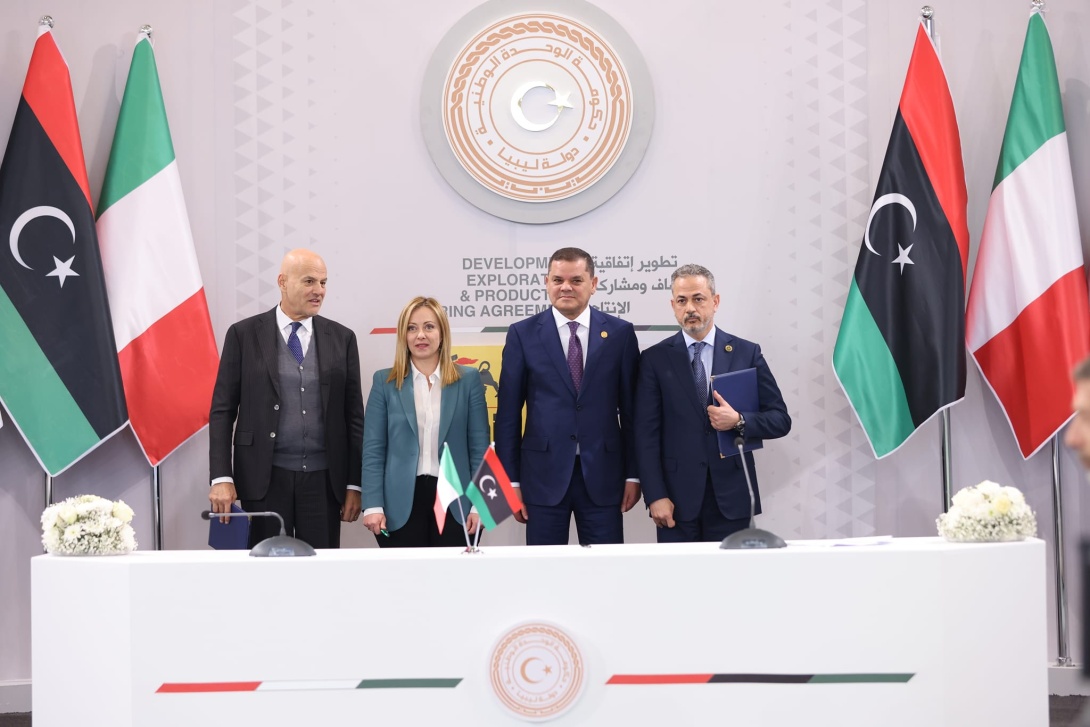By Abdullah Alkabir, a Libyan political writer and commentator
On the gas agreement with Italy

Arrangements for the Italian Prime Minister’s visit to Libya were preceded by Italian Foreign Minister, Antonio Tajani’s tour of Turkey and Egypt, where he conducted consultations focusing on the Libyan crisis, and Italian government's desire to join international efforts to achieve political change through elections. In order to avoid any obstruction to Italy's efforts to access more oil and gas, by the two regional actors in Libya, the Italian government must conduct consultations with both of them.
Turkey's key issue is how to secure its share of the eastern Mediterranean gas, and therefore, it will work to obtain guarantees that Italy will not align itself with Greece, and that Eni will not invest in areas that Turkey considers within its economic zone. Italy for its part has also to work to overcome old tension with Egypt, due to the murder of the Italian researcher Giulio Regeni in Egypt, and to resume development of the two countries’ relations.
Development of the offshore gas fields is a common Libyan-Italian interest that raises the volume of Libyan reserves, thus increasing production to meet domestic demand and increase revenues, and satisfy Italy's need, which seeks to compensate for the shortages of Russian gas supplies.
There is another far-reaching benefit that has not been drawn attention to in the futile debate about the agreement, its legitimacy and benefits, which is the impact of this economic development on strengthening national unity. For the great part of the crisis is related to the fair distribution of energy revenues to all regions of the country. The main argument of the leaders of the Libyan east since the emergence of Ibrahim Jadhran was that the Libya’s west dominates the largest part of the revenues, and marginalization of the east, though most of the fields and ports are located within the geographical scope of the latter, which is a false argument, because marginalization affected most of the regions of the country, and the organized corruption and embezzlement engulfed a significant part of the revenues.
Using the language of figures, all municipalities receive their share according to standard criteria even during the time of the former regime, but mismanagement, corruption of many officials, and weak or neglected oversight due to social factor, led to poor services, eroding infrastructure and stalling development.
No doubt, Dbeibah’s government benefited from activation of the old agreement, as it reinforced its strength and presence in the face of its opponents, by the visit of the high-level Italian delegation. Moreover, Italian involvement in international efforts aimed at conducting the elections, will reduce the chances of its removal, and the formation of another government that extends the transitional period and postpones elections. The Italian side will push to prevent the conflict from escalating and reoccurrence of unrest and wars, because development of production through joint venture between the National Oil Corporation and Eni requires a relatively stable and secure environment.
Irregular immigration an issue, that is worrisome to the Italian authorities, and it was among the files that were discussed with Dbeibah’s government, because the rates of migration access to the shores of the Italian islands increased last year by 50%, and much is required to reduce the rate, not mere the provision of a couple of speed boats, and training of Libyan Coast Guard. As there will be no real European effort to help African countries develop their capabilities and establish good governance that provides livelihood opportunities for the population to grant them some hope for future, so that they stop risking their lives in search of a decent and stable life overseas.
The challenge to the gas agreement was expected by political parties opposing Dbeibah's government, as all government's steps are subject to criticism, objection and skepticism, which is a normal practice by any opposition in a democratic system.
However, the objective in this case is different, as the opposition in a hybrid system aims to overthrow and replace the government, no matter how high its performance or how sound its positions are.
In sound governance systems, supreme national interests prevail over domestic politics. Moreover, oil experts confirmed the integrity of the agreement, in which Libya has a vested interest, and therefore objections to the agreement did go almost unechoed.
Disclaimer: The views and opinions expressed in this article are those of the writer, and do not necessarily reflect those of the Libya Observer



